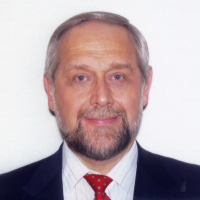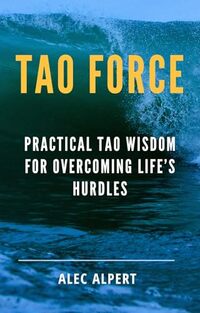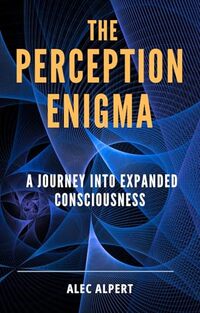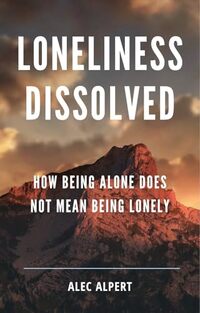Genre:
Advice & How To General Nonfiction Religion & Spirituality- Country: United States
- Books: 3
- Profession: Author, Engineer
- Born: 7 May
- Member Since: Apr 2023
- Profile Views: 7,286
- Followers: 187
- VISIT AUTHOR: Twitter, Goodreads, Amazon,
Alec Alpert's books are a compelling exploration of the depths of existence and personal growth. With his background as an author and an accomplished consultant in the medical device industry, Alec offers a distinctive viewpoint in the discussion. His writing shows his passion for understanding the fundamental nature of the universe and unraveling the mysteries of the human mind. His lifelong commitment to personal growth and exploration involves deep immersion in Eastern and Western philosophical and spiritual teachings and practices. This dedicated journey has bolstered his expertise in metaphysics.
Alec effortlessly merges metaphysics with scientific and engineering principles. He understands that resolving emotional and spiritual issues may require going far beyond a materialist paradigm. By delving into metaphysical principles, he provides a robust methodology to overcome life's challenges that may evade traditional thinking.
Alec's books serve as profound resources for personal growth and self-discovery. Through his insightful and thought-provoking writing, he takes readers on a journey of introspection and guides them toward activating their hidden potential. His exploration of unconventional insights beyond the confines of the materialist paradigm will expand your horizons and inspire you to embark on your own transformative journey.
Alec Alpert's Books
Stay in the loop on books by Alec Alpert. See upcoming and best-selling books by the author here. You'll also find the deals on books by Alec Alpert.
** Please note that the information or price displayed here may not be the updated. Make sure to double-check the latest book price before buying books.
** Also, there might be other books by Alec Alpert not listed on AllAuthor.
| Book |
|---|
Tao Force: Practical Tao Wisdom for Overcoming Life’s Hurdlesby Alec AlpertPublish: Nov 20, 2022Advice & How To Religion & Spirituality |
The Perception Enigma: A Journey into Expanded Consciousnessby Alec AlpertPublish: Jan 01, 2024Advice & How To Religion & Spirituality |
Loneliness Dissolved: How Being Alone Does Not Mean Being Lonely (Connecting with Existential Truths Series)by Alec AlpertPublish: Apr 17, 2023Advice & How To Religion & Spirituality |
Alec Alpert Interview On 31, Aug 2023
 "Alec Alpert, a remarkable author, and a visionary thinker, has carved a unique path in the realm of literature and personal development. Drawing from a rich tapestry of experiences as both an accomplished author and a consultant within the dynamic field of medical devices, Alec brings an unparalleled perspective to the literary landscape. Within the pages of Alec's books lies a treasury of wisdom, a wellspring of personal growth, and an invitation to embark on a journey of self-discovery."
"Alec Alpert, a remarkable author, and a visionary thinker, has carved a unique path in the realm of literature and personal development. Drawing from a rich tapestry of experiences as both an accomplished author and a consultant within the dynamic field of medical devices, Alec brings an unparalleled perspective to the literary landscape. Within the pages of Alec's books lies a treasury of wisdom, a wellspring of personal growth, and an invitation to embark on a journey of self-discovery."
From an early age, I've been curious about existence. A strong desire for understanding led me to comprehend the world's complexities. Having a philosophical inclination, I've naturally engaged with various aspects of existence, leading to a constant stream of existential questions.
My quest for answers started with reading books. I found that books either contained answers or stimulated my analytical thinking to produce them. Reading became my passion, and the wisdom I gained through books inspired experimentation to find practical solutions.
I've accumulated around four thousand books in my personal library, primarily in digital formats. I immersed myself in studying Eastern and Western teachings, choosing the Tao principles as my guiding philosophy in conjunction with insights from profound thinkers like Schopenhauer, Godel, Osho, Watts, Blavatsky, Plato, Aristotle, Krishnamurti, Einstein, Nietzsche, and others.
Another passion of mine is design and construction. I earned a Master of Science in Electrical Engineering and pursued a career in the medical device industry. I eventually became an independent consultant, utilizing my expertise in developing therapeutic, diagnostic, and surgical devices. This field demands analytical thinking, precise sciences, complex instrumentation, design skills, risk management, and regulatory compliance.
Writing books is my third passion. I specialize in self-help and personal development, aligning with my background in science and metaphysics. My role as a medical device engineer equips me with knowledge of the body-mind interaction within medical device applications. Resolving bodily issues through science and technology involves complex problem-solving, which parallels the approach in metaphysics. Both realms adhere to universal laws rooted in universal consciousness, even though metaphysics extends beyond the materialist paradigm to encompass the inner human world, while science concentrates on the external physical domain.
My engineering and metaphysical skills merge effortlessly in writing self-help books. It's akin to applying troubleshooting methods from science or metaphysics, as they share common problem-solving algorithms. That is how my multifaceted background influences my writing.
Your books delve into the depths of existence and personal growth. What inspired you to explore these themes in your writing, and how has your background as an author and a consultant in the medical device industry influenced your perspective?I drew inspiration from teachings in both Eastern and Western traditions for my personal growth. Among these, Tao principles had the most significant impact and became my guiding philosophy. These teachings delve into existence and human psychology, significantly shaping my philosophical mindset. Working as a medical device engineer, I observed distinct parallels between scientific and metaphysical perspectives, which naturally integrated within me. The problem-solving processes are similar in both paradigms, involving problem identification, analysis, and resolution. The key distinction lies in science addressing the external physical world, while metaphysics addresses the inner invisible realm.
Let's explore examples of how these paradigms share problem-solving methods, starting with medical technology:
Consider a cancerous tumor case. An oncologist evaluates the size, location, spread, metastasis, grade, genetics, patient health, and more. Treatment might involve radiation therapy using a medical linear accelerator LINAC that generates a high-energy x-ray beam projected onto the tumor area. This method eradicates the tumor over several sessions, monitored by the oncologist for progress until the patient becomes tumor-free. The process involves identifying, analyzing, determining, executing, and verifying the solution.
Now, let's examine the metaphysical approach:
Take the issue of loneliness, ranging from mild to severe. Severe cases might require professional intervention.
Loneliness, an emotion, can be resolved with metaphysical methods. I can confirm this as I resolved my own loneliness through metaphysics, detailed in my book "Loneliness Dissolved: Activating the Extraordinary Within." In this book, I employed the same problem-solving algorithms used to treat cancerous tumors in the above example: identify, analyze, and provide tested solutions. Readers’ feedback validates problem-solving effectiveness.
Science and metaphysics have applications based on the problems’ nature, sharing algorithms rooted in universal consciousness. My roles as a metaphysical author and medical device consultant harmonize well.
In summary, my drive to write stems from a passion for troubleshooting problems, be they in engineering or personal growth.
Your writing demonstrates a passion for understanding the fundamental nature of the universe and the mysteries of the human mind. Can you tell us about some of the key insights you've gained through your exploration of Eastern and Western philosophical and spiritual teachings and practices?A crucial insight I acquired involved adopting Tao principles as a way of life. This meant aligning with universal Tao principles, which led to a profound transformation in my emotional well-being, relationships, and overall contentment.
Tao originated in China over two thousand years ago by sage Lao Tzu, who documented his insights in "Tao Te Ching." Tao isn't a doctrine, philosophy, religion, or dogma. It's not about worshipping deities. Instead, it's a deep understanding of living harmoniously according to nature's laws. It goes beyond logic because life is inherently illogical and paradoxical. Lao Tzu reflects life without altering it.
In my book "Tao Force: Achieving Emotional Mastery Through the Tao Principles," I delve into Tao's essence and its life-transforming impact. The book is a dialogue between a Tao master and an engineer, reflecting my experiences with spiritual teachings.
Metaphysics can often be perceived as abstract or esoteric. How do you make these complex concepts accessible and relatable to a broader audience in your writing?When introducing metaphysical concepts, it's essential to communicate transparently about their origins and nature, especially if they lack modern scientific evidence. Here are ways to help readers grasp the value and transformative potential of these concepts:
Share my personal experience by describing how I came across complex ideas and concepts.
Provide historical context by offering insights into concepts' historical and cultural roots, including how they have been practiced and valued in established philosophies.
Explain the principles by breaking down the concepts into simple principles and how they work. Provide examples and analogies to illustrate how they can be applied in real-life situations. This can help the reader understand the practical value of these concepts.
Address skepticism by acknowledging that these concepts may not have modern scientific evidence but explain that they have been tested and validated through centuries of practice and observation. Also, I encourage the reader to approach these concepts with an open mind and an attitude of experimentation.
Provide resources by directing the reader to additional resources, such as books, articles, or experts, who can offer more information and perspectives on these complex concepts. This can help the reader deepen their understanding and provide a sense of credibility and legitimacy.
The goal isn't to prove scientific validation but to help readers recognize the concepts' value through personal experience, historical context, and practical application.
Throughout your lifelong commitment to personal growth and exploration, what have been some of the most significant challenges you faced, and how did you overcome them?Loneliness proved to be my most significant challenge. I explored conventional solutions such as friendships, social activities, relationships, and marriage. Despite temporary relief from intense loneliness, none offered a lasting cure.
The breakthrough came when I immersed myself in metaphysical teachings and deeply comprehended loneliness. I recognized the distinction between loneliness and being alone. While synonymous in dictionaries, Eastern teachings define them as opposites. Embracing solitude became transformative. Writing, a solitary pursuit, demands isolation without succumbing to loneliness. This perspective shift relieved my loneliness. I detail this paradigm in my book "Loneliness Dissolved."
Your books inspire readers to expand their horizons and explore unconventional insights. Could you share an example of a particularly unconventional insight that had a profound impact on your own life and journey of self-discovery?One insightful realization that deeply impacted my life was recognizing my intrinsic connection to universal consciousness—an all-knowing, omnipresent, and omnipotent force. Eastern metaphysical teachings underline our unity with this consciousness, the source of everything, including ourselves. We originate from it and return to it, implying our eternal nature. Consequently, we are immortal, eliminating the fear of death, which, in metaphysics, doesn't exist. This perspective sees life and death as materialistic concepts.
Metaphysically, we transition from the high-energy vibration of universal consciousness to the lower-energy vibration of a physical body to experience life on Earth. Our body serves as a vehicle for our Earthly exploration. This metaphorical vehicle serves its purpose for around eighty years, akin to a car requiring replacement due to high mileage.
This notion of being connected to universal consciousness has become intrinsic. I perceive myself simultaneously as a cosmic observer and an Earthly traveler. This perspective shapes how I handle daily challenges. I evaluate problems, choosing whether to intervene or let them resolve naturally. When needed, I approach issues with conventional methods or metaphysical insights.
Ultimately, this perspective of having universal consciousness alongside me influences my emotional state, making me calm, confident, resilient and efficient.
Many people struggle to bridge the gap between spirituality and science. How do you navigate and reconcile these seemingly different realms in your writing and teachings?In my case, there's no need for reconciliation, as I remain deeply spiritual even during tasks involving engineering and science. When I focus on medical device design, testing, or manufacturing, I apply my engineering expertise using the laws of physics, mechanics, chemistry, electricity, and other disciplines, recognizing their connection to universal consciousness.
Historically, philosophers often navigated both metaphysical and scientific realms. The separation between philosophy and science developed gradually over the centuries, notably with the Scientific Revolution. This led to distinct methodologies, objectives, and domains.
Philosophers made significant contributions to science. For instance, Rene Descartes is known as the "father of modern philosophy." He established a systematic approach to skepticism and contributed to geometry and analytic geometry through the Cartesian coordinate system. This innovation revolutionized how geometric relationships and mathematical concepts were represented and analyzed, impacting various fields.
Other philosophers, like Isaac Newton, Immanuel Kant, Charles Peirce, and Thomas Kuhn, also influenced science.
This dual perspective extends to my writing. I effortlessly integrate both metaphysical and scientific aspects into my work because they originate from the same source—universal consciousness.
As an author, what role do you believe literature plays in fostering personal growth and encouraging readers to embark on transformative journeys?Literature, especially metaphysical literature offering practical insights into existential truths and human nature, significantly contributes to personal growth. Books profoundly impact me, and continual self-education through extensive reading, discourse listening, and introspection is integral to my life.
The fundamental truth is that our external life mirrors our internal thoughts. Changing our internal landscape leads to shifts in our external reality. However, achieving such a paradigm shift demands effort, education, and commitment—no one else can accomplish it on our behalf. Friends and relatives might offer consolation, advice (which may not be beneficial), or financial support, but the transformational journey is uniquely ours. Thus, reading should be an inherent trait that catalyzes life-changing evolution. Allocating ample time for reading and self-education is vital for everyone.
A renowned motivational speaker, Jim Rohn aptly stated, "Reading is essential for those who seek to rise above the ordinary."
Marcus Cicero emphasized, "A room without books is like a body without a soul."
Hence, my advice is straightforward: If self-transformation and life enhancement are desired, commence your reading journey without delay.
How did you come up with the idea for your book, "Loneliness Dissolved"?The inspiration for "Loneliness Dissolved" arose from my personal battle with loneliness. I aimed to convey my firsthand experience and proficiency in overcoming loneliness to fellow individuals facing similar struggles. The techniques and insights shared in this book enabled me to conquer loneliness in my own life, and I am confident that the content can benefit many others.
How do you stay motivated and inspired to continue writing and sharing knowledge with others?Writing is my passion. I find intrinsic motivation and inspiration to write. I eagerly engage with my computer for writing. My mind remains creatively active, generating ideas persistently, even during routine tasks like dishwashing, laundry, housecleaning, or driving. Ideas about content, word choices, paragraph structure, and reader perspectives continue to flow.
Upon publication of my books, the practical guidance is shared with readers. This sharing process reinforces my inspiration, knowing that my advice contributes to problem-solving and enhances readers' well-being, fostering happiness, confidence, calmness, and resilience.
How do you balance the use of complex ideas and concepts in your writing to make them accessible and relatable to a broad audience?I employ various methods to simplify intricate ideas. Firstly, I tailor my writing to my target audience's preferences and needs. Secondly, I employ straightforward, succinct language that is universally comprehensible. Thirdly, I structure my content into brief paragraphs, often comprising just a few sentences or even a single sentence. I opt for brevity in my books, enabling swift reading. This approach allows me to produce more books, thereby extending my assistance to a broader audience. Fourthly, I explain complex concepts through relatable examples from everyday life that readers are already familiar with.
As an author specializing in personal transformation, what message or core idea do you hope readers take away from your books?I hope my readers embark on a personal transformation journey toward expanding self-awareness and consciousness. Personal transformation transforms lives. Proficiency in higher realms of knowledge and wisdom always improves finances, relationships, and emotional mastery. Conquering loneliness, depression, anxiety, and boredom is only possible when going beyond materialist thinking. Science surely can do a lot on a physical plane but when it comes to soul searching metaphysics cannot be avoided. Materialist paradigm in conjunction with the metaphysical paradigm is a potent mix if we are to take our life to the next level.
I trust that my readers will embark on a journey of personal transformation, enhancing self-awareness and consciousness. Such transformation yields tangible changes in one's life. Mastery of profound knowledge and wisdom enhances financial stability, relationships, and emotional control. Overcoming emotional challenges like loneliness, depression, anxiety, and boredom necessitates transcending materialistic perspectives. While science addresses physical aspects effectively, metaphysics is vital for introspection. Combining materialistic and metaphysical perspectives offers a powerful approach to elevating our lives.
What projects or topics are you currently working on, and what can readers expect from your future writings?I am currently authoring a book that delves into the formation of opinions and worldviews. It examines the duality and unity inherent in existence, dissects prevalent belief systems and explores the societal impact of quantum physics and artificial intelligence. The book also addresses adaptation to the ongoing societal changes and emphasizes how opinions shape our lives and survival. The core objective is to illustrate the influence of beliefs and offer guidance in forming accurate beliefs grounded in universal laws. This book is scheduled for release in October 2023.
Looking ahead, my focus remains on delving into the expansive metaphysical realm. The potential for writing within this realm is limitless, given its vastness comparable to the eternal universe. I have many creative ideas that can engage me for a lifetime.
What message or advice would you like to leave with your readers who are seeking to unlock their hidden potential and pursue their path of self-discovery?A vast repository of information is readily accessible across various subjects, facilitated by the internet and AI-driven searches. Countless paperbacks and ebooks are available for readers to explore. Consequently, those seeking to discover their latent capabilities can initiate the process by engaging with works by renowned thinkers, including philosophers, scientists, business leaders, and motivational speakers. Online platforms such as YouTube host a multitude of discourses. Another avenue is participation in discussions at ashrams and retreat centers, providing environments conducive to spiritual and personal growth.
My primary suggestion is establishing a personal library, acquiring as many books as one's budget allows. Such an investment holds permanent value, immune to depreciation or theft. This repository becomes a precious asset, encouraging self-knowledge that can translate into tangible outcomes and positive emotions.
To initiate the journey of self-discovery and unlock hidden potential, I recommend exploring the teachings of Osho, Alan Watts, Krishnamurti, and Nietzsche.
How did you come across AllAuthor? What made you sign up and what has your experience been so far?I discovered AllAuthor while searching for a platform connecting authors and readers. Seeing the potential for effective interaction, I enrolled due to AllAuthor’s programs that efficiently assist in marketing books.
Engaging with AllAuthor has been a positive experience. Notably, their proficient professional services have yielded tangible results. The team's approach, marked by a friendly demeanor, adds to the quality of interaction. This blend of effective services and amiability has solidified my satisfaction as an AllAuthor user.
Ask Alec Alpert a Question
Have brimming questions to ask author Alec Alpert? Ask whatever you like, but keep it appropriate.
** Please note that unanswered questions will not appear on the page. Refrain from posting promotional messages.
Contact Alec Alpert
The author, a good book and you! Contact Alec Alpert here.
** Please refrain from spamming and don’t bombard the author with promotional mails/messages. Your IP/Email address may be blocked if found doing so.
Contact Author on:
Twitter,




